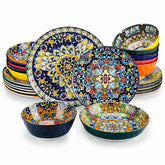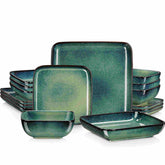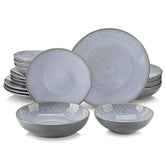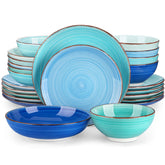Lead-Free & Non-Toxic Stoneware Dinnerware - Healthier Dining
Navigation
- Go Lead-Free for Safe Stoneware
- Look for Non-Toxic Certifications
- Stoneware's Natural Suitability for Raw Foods
- Be Cautious with Antique Stoneware
- Choose Your Stoneware Wisely
In today's health-conscious world, more people are adopting specialized diets with strict guidelines around ingredients and prep methods. From raw foodies to gluten-free adherents to paleo devotees, the way food is served and prepared is deeply important. This is where stoneware comes in as an ideal material for serving and prepping recipes for unique dietary needs.
With its neutral flavor profile and naturally smooth finish, stoneware excels at maintaining the integrity of special diet ingredients without impacting taste or texture. It also offers options free from potentially harmful materials like lead and other toxins. Let's explore the healthiest stoneware choices for unique dietary lifestyles.
Go Lead-Free for Safe Stoneware
First, a critical consideration - ensuring your stoneware is free from hazardous materials like lead and cadmium. Some ceramic glazes contain high levels of heavy metals that can leach into food especially acidic ingredients like tomatoes or citrus. This makes lead-free stoneware a top priority for health.
Seeking out stoneware made from natural clay with lead-free glazes is highly recommended. Brands like vancasso, Leafware, Pampered Chef, and Emile Henry offer lead-free lines. Many retailers now actively promote lead-free ceramics too. Look for clear labeling though when in doubt, contact manufacturers directly to verify.
Visually inspecting stoneware can also help identify lead materials. Glazes with a glossy finish in bold colors like red and yellow often contain lead and are best avoided. Instead choose earthy, muted glaze hues which are lead-free. With vigilance, you can equip your kitchen with non-toxic stoneware perfect for specialized diets.
Look for Non-Toxic Certifications
Beyond lead, also consider potential toxins like cadmium, arsenic and radioactive materials that may find their way into stoneware. Seek out manufacturers that adhere to strict regulations in countries like China, Germany, Japan and the US.
Certain organizations provide non-toxic certifications for stoneware too. For example, the Prop 65 warning label means hazardous chemicals are present while the CPSIA Compliant label indicates a product is free from over 1,000 tested toxins. Do your research to ensure the safest stoneware possible.
Stoneware's Natural Suitability for Raw Foods
Raw food diets centered on uncooked, unprocessed foods are another area where stoneware shines. Its naturally nonporous, neutral surface won't leach flavors or odors into raw preparations.
Stoneware's smooth finish also makes it ideal for tasks like slicing raw meats and chopping vegetables without impacting delicate textures. Use stoneware for plating raw dishes as well.
And since stoneware withstands heat well, you can simply bake or boil used dishes to sanitize between uses while retaining benefits for raw preps. With strong, inert stoneware suitable for food contact, raw diets have a perfect prepping and serving solution.
Be Cautious with Antique Stoneware
What about grandma's old stoneware passed down through generations? Should you use heirloom pieces for special diets? Caution is warranted.
Older stoneware often contains unsafe levels of lead, arsenic, or other toxins. Without clear origins, it's best to err on the side of caution. Still want to use it? Consider professional testing or at-home lead testing kits. Just avoid acidic or cooked foods in antique stoneware until you can confirm it's safe.
If tests reveal high levels of toxins, it's best to retire the stoneware for display only. Lead can leach into foods over time so continuous use of antique stoneware with toxins is not recommended, especially for special diets. When sourcing stoneware, opt for new from reputable makers.
Choose Your Stoneware Wisely
Special diets require extra care in safe, non-toxic materials. With vigilance and some research, selecting the healthiest stoneware options is straightforward. Seek out:
- Lead-free stoneware from trusted makers
- Natural clay construction without harmful glazes
- Non-toxic certifications from accredited agencies
- Modern stoneware instead of antiques
Then rest assured your stoneware will maintain the integrity of your fresh, raw foods or strict diet ingredients. Don't settle for anything less than the healthiest materials when it comes to the foods you and your family consume. Stoneware can deliver the safety and quality specialized diets demand. Click to explore our healthiest dinnerware sets.













